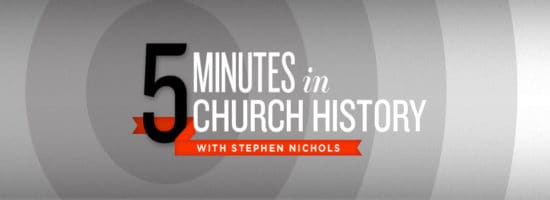
The Most Important Thing to the Reformers
What is the role of liturgy in worship? Dr. Stephen Nichols is joined in the studio by Jonathan Gibson and Mark Earngey, coauthors of Reformation Worship.
Dr. Stephen Nichols: Today, I’m joined by two very special guests. My first guest is Dr. Jonathan Gibson. He’s an assistant professor of Old Testament at Westminster Theological Seminary in Philadelphia. He was born in England and was raised in Northern Ireland. It’s a pleasure to have you, Dr. Gibson.
Dr. Jonathan Gibson: Thanks very much, Steve. It’s a pleasure to be on the program.
Dr. Nichols: I’m also joined by Mark Earngey. He’s an Anglican minister from Sydney, Australia, and he’s currently undertaking doctoral studies at Oxford University. Mark, it’s a pleasure to have you on the program.
Rev. Mark Earngey: Thank you very much. Good to be here.
Dr. Nichols: These two have collaborated on a book. I love the title. It’s Reformation Worship: Liturgies from the Past for the Present. I love that it’s about the Reformation, worship, and this idea that the past is for the present. Gentlemen, why did you do this book, and what is this book about?
Dr. Gibson: Well, we’re both Christian ministers. I was a minister in Cambridge, England, for three years. I had sabbatical leave, and I was tasked by my denomination in the United Kingdom, the International Presbyterian Church, with putting together some resources for liturgy to be used in our churches. Long story short, I happened upon a few rich liturgical sources from the Reformation era, and I went off down rabbit trails and thought it would be wonderful to have all of these liturgies that were written in the sixteenth century put together in one volume, updated, translated, and collated all together for pastors and ministers. I found it to be a great help as I was leading worship each week to actually be delving into some of these orders of service, prayers, and readings, learning about how worship was thought about by the Reformers in the sixteenth century.
Rev. Earngey: Something I would add to that: one of the things that really sparked it for Jonny and me was just looking at some of these liturgies and considering the theological thoughtfulness that our Reformers put into these liturgies. Indeed, looking at the orders and looking at the elements that they included in these liturgies and thinking, “This is something that clergy today can look at and see some marvelous principles and theological principles to put into practice, things perhaps that have been neglected, forgotten, or left by the wayside, but things to build up the saints and feed people week by week.”
Dr. Nichols: You know, as I look over the table of contents of this book, I really appreciate it. Both of you have some wonderful essays to set the stage up front, and there’s names we should expect to see in here. Of course, we’ve got Martin Luther. We’ve got one of my favorite Reformers from Basel, Johannes Oecolampadius. Huldrych Zwingli is in here. John Knox is in here. Zacharias Ursinus, whose name is associated with the Heidelberg Catechism, he’s in here. The thing that holds all these Reformers together is a Word-centered approach to worship.
Dr. Gibson: Yes, very much so, Steve. I think you see that in Luther’s liturgy where he writes in his preface that we basically need to get back to the Word and let the Word shape everything we do in church. You see it also with Calvin and his tradition when he writes the liturgy in Geneva. It’s really a movement that flows out of sola Scriptura. For the Reformers, everything we do must flow from the Scripture. In a sense, they were saying that it is God who calls us to His worship through His Word, and that worship to which He calls us should be shaped and guided by His Word. The beautiful thing about these liturgies is that the Word is present not just in the readings that take place during the order of service of the Word or at the Lord’s Supper, but also that the prayers bleed biblical verses. They’re full of thoughtful reflection on how the Scriptures teach us how to pray and what to pray.
Dr. Nichols: Well, we’ve only scratched the surface here talking about Reformation Worship. The good news is we’ll be back next week to finish the conversation.
Stay connected with 5 Minutes in Church History by getting the weekly podcast on iTunes, SoundCloud, or via RSS. You can also subscribe to the blog via RSS and follow us on Twitter and Facebook.
(This podcast is by Ligonier Ministries. Discovered by Christian Podcast Central and our community — copyright is owned by the publisher, not Christian Podcast Central, and audio is streamed directly from their servers.)